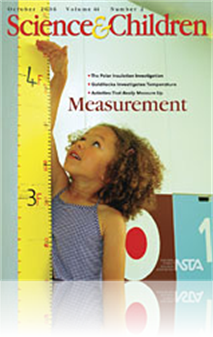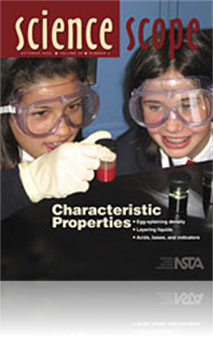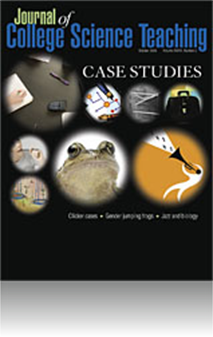All Resources
Journal Article
When Goldilocks finds three bowls of porridge at different temperatures in the three bears’ house, she accurately assess the situation and comes up with one of the most recognizable lines in children’s literature, “This porridge is too hot; thi...
Journal Article
Scope on Safety: (Lack of) safety in numbers?
What is the safe number of students for one teacher to teach? Like many issues in education, there is no one-size-fits-all answer. There are several factors that need to be considered when establishing the safe number of students to teach. In this mo...
Journal Article
One of the most powerful technology tools available to science teachers is often the least used. A course management system (CMS) is a web-based application that provides an online distance learning platform for teachers and students. CMS platforms s...
Journal Article
Science Sampler: Professor Color Presents... Acids, bases, and indicators
If you are looking for an exciting way to introduce a unit on acids, bases, and indicators, consider using the following demonstration, based on a chemistry presentation described by Hutton and Smith (1984), which has been adapted for use in the midd...
Journal Article
Activities that Really Measure Up
Linear measurement is more than just learning how to use a ruler. In the early grades, measurement activities develop students’ understanding of the properties of objects as well as what it means to measure objects. Hands-on activities can enable...
Journal Article
Editorial: Teaching With Cases -- Let Me Count the Ways
We're back, with yet another issue on the case study method of teaching. It's a method we think has expanding possibilities, especiallially in its application to science education. The use of stories to educate students has existed for thousands of...
Journal Article
Ask the Experts -- October 2006
In this month's Ask the Experts column, the following thought-provoking question is addressed: "Why did mother nature use uracil to replace thymine in mRNA (messenger ribonucleic acid)? What is the advantage of using U instead of T in the RNA?"...
Journal Article
Building Knowledge & Intrigue: Creating an Interactive Science Museum
The energy and enthusiasm shown by young students walking through the doors of an interactive science museum is difficult to surpass. The excitement and wonder that informal science education generates were instrumental in the author’s decision to ...
Journal Article
Science Sampler: Mapping variables
One of the biggest obstacles students encounter during the inquiry process is conducting valid investigations. Many students get caught up in the questions they have, the variety of materials they have access to, and the excitement of "doing" science...
Journal Article
Idea Bank: More than Multiple-Choice
Multiple-choice questions typically dominate tests in high school chemistry classes. The modification described in this article requires students to explain their reasoning behind each multiple-choice answer. This testing format demands more grading ...






